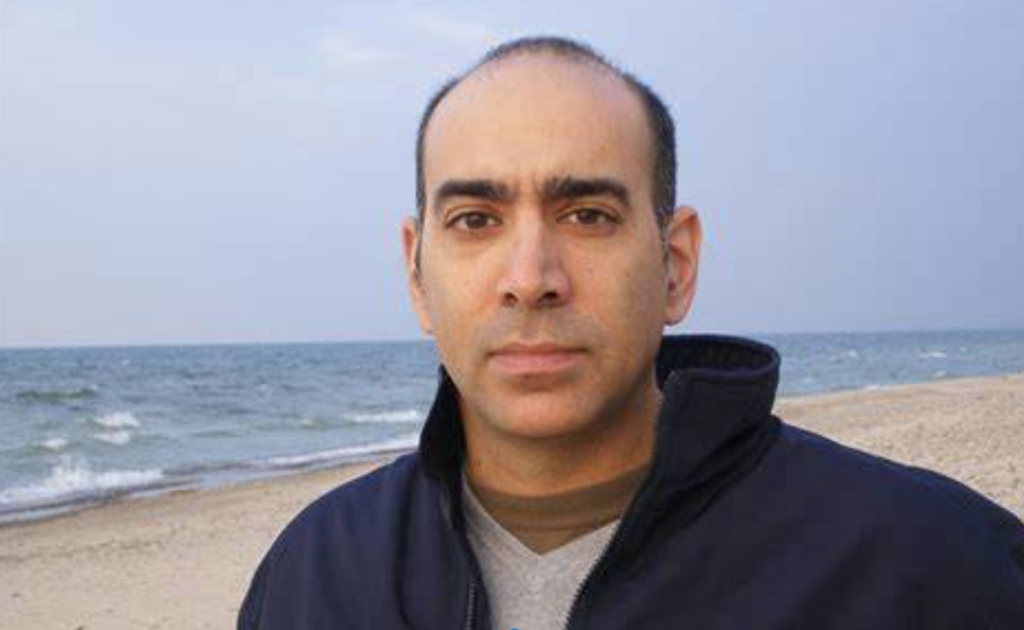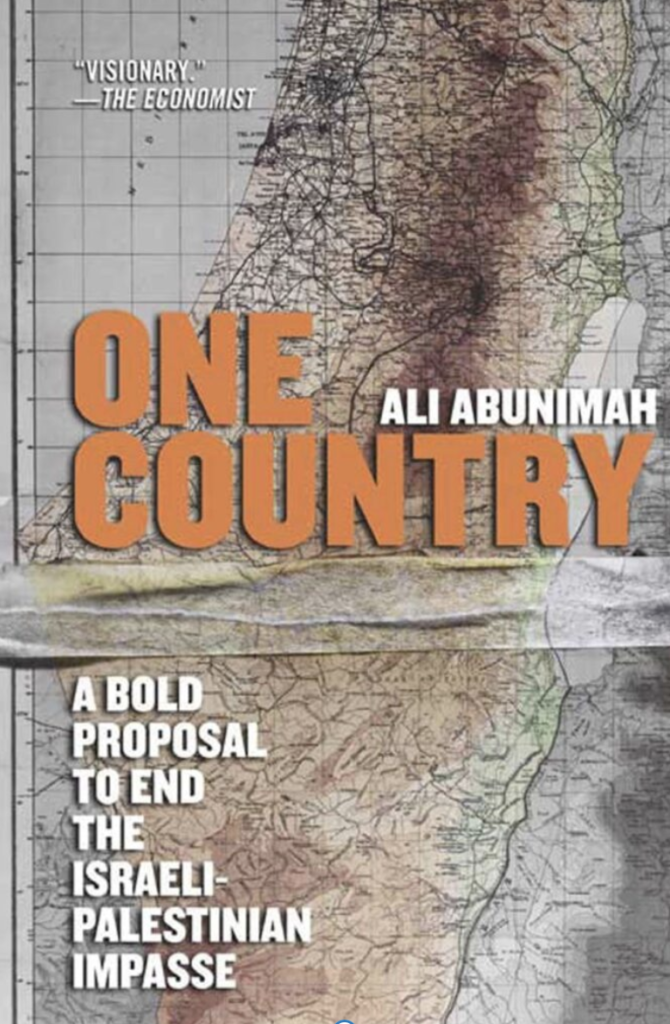Pathbreakers of Arab America— Ali Abunimah

By John Mason / Arab America Contributing Writer
This is the thirty-ninth of Arab America’s series on American pathbreakers of Arab descent. The series includes personalities from entertainment, business, sports, science, academia, journalism, and politics, among other areas. Our thirty-ninth pathbreaker, Ali Abunimah, is a Palestinian American activist and journalist. Ali is a co-founder of The Electronic Intifada website and is described as “the leading American proponent of a one-state solution to the Israeli–Palestinian conflict.” Ali’s mother is a 1948 refugee from a Palestinian village that became part of Israel, and his father is from a town in what is now the occupied West Bank.
An outspoken critic of the two-state solution, Ali Abunimah proposes a single binational state under joint Palestinian-Israeli control
Ali Hasan Abunimah was born on December 29, 1971, in Washington, D.C. He traveled with his diplomat parents to the United Kingdom and Belgium before returning to the U.S. to begin his college career. His father served as the Kingdom of Jordan’s ambassador to the United Nations. According to Wikipedia, “part of the Abunimah family members say their forefathers came from Spain to Palestine following the fall of Granada in 1492.”
Ali graduated first from Princeton University and then from the University of Chicago. He began his social activist career at Princeton, then in Chicago, where he worked as a community-based organization researcher. There, Abunimah came into contact with that city’s Arab American community. That, in turn, brought him in contact with the Arab American Action Network. Ali later served as vice president of the network and continues to be a board member today. He is also a fellow at the Palestine Center.

In 2001, Abunimah co-founded The Electronic Intifada (EI) website. It is a non-profit online publication that covers “the Israeli–Palestinian conflict from a Palestinian perspective.” Ali spoke about many important issues surrounding the Israel-Palestine conflict from that venue. An abbreviated sampling of several of these issues derived from The EI website and other sources follows:
Israel and Palestine—based on Ali’s book, One Country, Abunimah argues that the two-state solution to the Israeli–Palestinian conflict has “no chance of being implemented” and has been superseded by a “de facto binational state” under Israeli control. He supports the creation of a single democratic state based on the equality of citizens and considering the legitimate concerns of Israel’s Jewish population. All residents of Israel and the territories it now occupies would enjoy equal rights and obligations. Some critics see such a state as tantamount to the destruction of the State of Israel. This proposal would obliterate the Jewish character of the country in favor of majority Arab rule.
Strength of U.S.-Israel relationship—Abunimah says, first, Israel plays a vital role in U.S. imperialism by allowing it to control the Middle East and their resources; second, “there are powerful organizations and networks that consider support for Israel very important, and they influence the politics of the United States through elections and contributions to political campaigns to make candidates adopt to Israel’s position.”
The Palestinian Authority (PA)—Abunimah wrote in a December 2012 article for Al Jazeera, “The PA has been equipped and trained under US supervision to act as an auxiliary for Israeli occupation forces to suppress any forms of Palestinian resistance, to beat and suppress Palestinians expressing their views and to arrest and harass journalists who dare to criticize it. … The Abbas PA’s record of collaboration with Israel against the interests of the Palestinian people is long, shameful, and well documented.”
West Bank settlements—Debating Jonathan Tobin of Commentary on Democracy Now! in July 2012 about the legality of West Bank settlements, Abunimah argued that Israel’s “violent settler colonial enterprise in the West Bank has no international legitimacy” and is “maintained through violence and a system of military tyranny and apartheid.” He called the settlements “war crimes,” described the IDF as “Israel’s Jewish sectarian militia,” and spoke of “the Jim Crow-like racism at the core of this Zionist ideology.”
The third intifada—Abunimah has publicly supported the idea of a third intifada. On January 20, 2012, he posted on Twitter: “Isn’t it the time for a popular Palestinian revolution in the form of a third intifada?” He also supports the Boycott, Divestment, and Sanctions movement, writing in the New Statesman in July 2012 that “Increasingly among Palestinians, the focus is shifting away from statehood towards a discourse on rights.

Abunimah’s response to the present Gaza War
In response to the second Gaza War in 2008-09 (the first was in 1917 when the British controlled Palestine), Abunimah wrote an article in The Guardian. Titled “We have no words left,” it is about the end of the truce: “But what is Israel’s idea of a truce? It is straightforward: Palestinians have the right to remain silent while Israel starves them, kills them and continues to colonize their land violently” and “any act of resistance including the peaceful protests against the apartheid wall in the West Bank is always met by Israeli bullets and bombs.” That was 2008-09.
Given the new Gaza war, Abunimah has rendered a perspective on that via his Electric Intifada site. Its express purpose is to play “a pivotal role in combatting disinformation and fake news, providing alternative perspectives, analysis, and firsthand accounts from those at the center of all the death, destruction and suffering – the millions of people trapped in Gaza.”
It continues, “The mainstream US media and … the European media is extremely pro-Israel…They take the Israeli line, and they take anything Israel says almost as if it’s a fact, even though from the very beginning, most of what Israel said has turned out to be lies.” EI has continued to support its writers and contributors in Gaza through the war. Its first concern was for their well-being and safety, though some of them have been killed or injured, along with their family members.
Abunimah and EI have been especially critical of attempts to deliver aid by airdrops. First, the Jordanian air force dropped aid packages into the Gaza Strip. Then, the U.S., in collaboration with the Jordanian air force, dropped aid packages into Gaza on Saturday. EI reported on these airdrops, noting, “What is being marketed as benevolent assistance amounts to humanitarian aid theater that does nothing to end the systematic and intentional campaign of starvation. Israel and its American and European allies, with the complicity of regional regimes, are waging against Palestinians.”
Experts and aid officials have made clear that these airdrops are not an effective way to alleviate the starvation of 2.3 million people in Gaza “deliberately caused by Israel, with the full backing of the United States. The effect – whether intentional or not – is to relieve Israel and its backers of pressure to lift the total siege Tel Aviv has imposed on the coastal enclave with the clear intent of causing maximum suffering and death to as many people as possible.”

David Harden, a former official with USAID, the U.S. international development agency, averred, “Airdrops are inefficient, expensive, dangerous, and only helpful when there are no other delivery options.” EI added, “Airdrops are primarily for the Biden administration’s benefit — to paper over a massive policy failure.” EI insists, “Washington wants the genocide to continue. It just wants to pretend that it is aiding Palestinians while it helps Israel murder them.”
Abunimah, through EI, provides a harsh picture of the Israeli-Hamas war in Gaza. And, indeed, it is harsh. The Israel Defense Force’s unrestrained killing of 32,000 Palestinians in Gaza, two-thirds of whom are women and children, is as much deserving of blame as Hamas’ is for its initial and brutal attack on 1,200 Israelis. Both are the hideous results of an awful war. But Abunimah is suitable to play the role of the antagonist—one of millions of proud Palestinians who are so far losing thousands of their people, month after month.
Sources:
– “Ali Abunimah,” Wikipedia Biographies of Arab Americans, 2024
–“We have no words left,” by Ali Abunimah, in The Guardian. Archived from the original on 1/4/2009
–“Why do the media keep parroting Israel’s genocidal lies? by Ali Abunimah, The Electronic Intifada, 11/12/2023
–“Demeaning airdrops over Gaza are humanitarian aid theater,” The Electronic Intifada, 3/3/2024
John Mason, Ph.D., focuses on Arab culture, society, and history is the author of LEFT-HANDED IN AN ISLAMIC WORLD: An Anthropologist’s Journey into the Middle East, New Academia Publishing, 2017. He has taught at the University of Libya, Benghazi, Rennselaer Polytechnic Institute in New York, and the American University in Cairo; John served with the United Nations in Tripoli, Libya, and consulted extensively on socioeconomic and political development for USAID and the World Bank in 65 countries.
The views and opinions expressed in this article are those of the author and do not necessarily reflect the position of Arab America. The reproduction of this article is permissible with proper credit to Arab America and the author.
Check out our Blog here!









